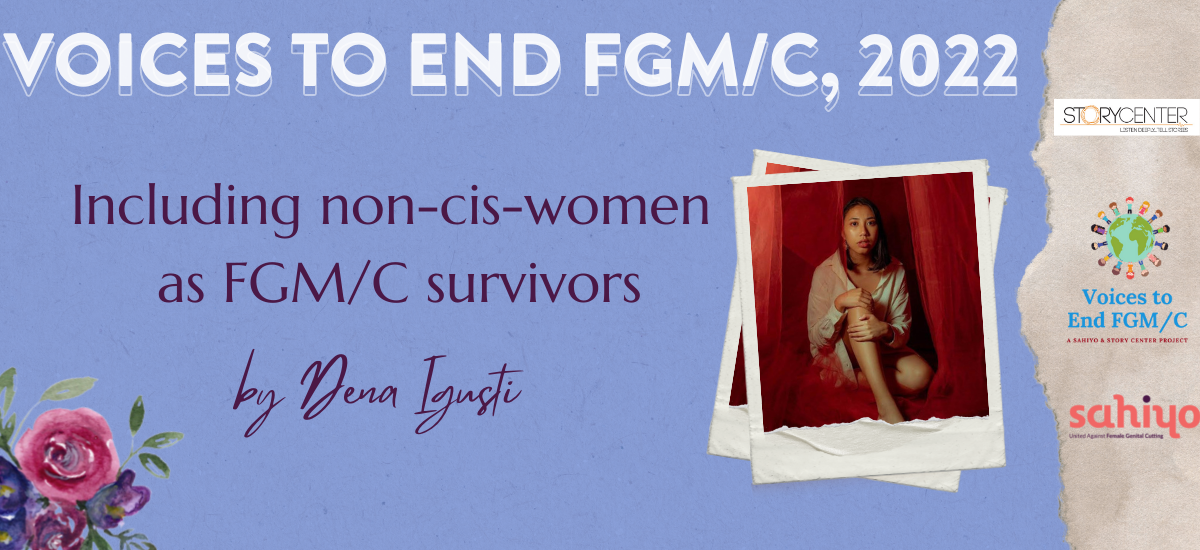
Including non-cis-women as FGM/C survivors
By Dena Igusti
I wanted to be a part of this year’s Voices to End FGM/C digital storytelling workshop so I could talk more about my experiences navigating being a non-binary survivor of FGM/C. Unfortunately, a lot of statistics and narratives surrounding FGM/C only focus on cisgender women. In order for me to access resources for FGM/C survivors, I felt pressured to identify as a cis-woman and nothing more. When I found a service that provided counseling for survivors, I saw that it was available only to women and girls. When asked for my pronouns, I removed “they” and stuck with “she.”
I can’t say therapy didn’t help me because of this. I learned about PTSD. I learned my triggers. I learned that my fear of betraying my family stems from the fear that is a result of FGM/C. I was given two shiny stones, one pink and one iridescent blue that I still keep in my wallet in case I experience panic attacks. I learned that I fail no one when I am myself. But because I came into counseling identifying as a woman, my therapist tells me that regardless of my sexuality and how I perceive sex, I’m still a woman.
On most websites and articles, FGM/C refers to the vagina as “girl’s genitals.” From language to resources, all aspects of FGM/C, the before, during, and after, assume an FGM/C survivor (often a child) has and always will be a cis-woman. They also constantly associate FGM/C with just womanhood. I’ve seen my friends call me non-binary, but then call me a girl when talking about FGM/C. I can’t fully blame them. When I talk about my trauma, I still slip up and call myself a woman. As I continued to talk about my experiences as an organizer and a writer, I was constantly referred to as a woman. This also led me to a realization that non-cis-women survivors may not have been accounted for within FGM/C statistics; or we have been, but were misgendered in that process.
When talking about FGM/C, we need to understand that not all survivors are cis-women. We cannot uphold the idea that FGM/C is rooted in cis-womanhood, which forces survivors to conform to those expectations. Through this workshop, I wanted to raise awareness on how a large percentage of FGM/C survivors, specifically trans men and non-binary people, are left out of their own healing because we only associate FGM/C with womanhood.
Dena Igusti is a queer non binary Indonesian Muslim poet, playwright, filmmaker, producer, and FGC survivor & activist born and raised in Queens, New York. They are the author of CUT WOMAN (Game Over Books, 2020) and I NEED THIS TO NOT SWALLOW ME ALIVE (Gingerbug Press, 2021). They are the founder of Dearest Mearest.
Their work has been featured in BOAAT Press, Peregrine Journal, and several other publications. Their work has been produced and performed at The Brooklyn Museum, The Apollo Theater, the 2018 Teen Vogue Summit, Players Theatre (SHARUM, 2019), Prelude Festival (Cut Woman, 2020), Center At West Park (CON DOUGH, 2021), The Tank (First Sight 2021 at LimeFest), and several other venues internationally. They are a Culture Push Associated Artist. They are currently a 2021 Playwright-in-Residence for Rogue Theater Festival.
They are a 2022 Sundress Arts Resident, 2022 Best of the Net Nominee, 2021 Baldwin For The Arts Resident, 2021 Hook Arts Media Digital Connections Fellow, 2021 City Artist Corps, 2021 Stories Award Finalist, 2021 LMCC Governor’s Island Resident, 2021 Broadway For Racial Justice Inaugural Casting Directive Fellow, 2020 Seventh Wave Editorial Resident, 2020 Ars Nova Emerging Leaders Fellow, 2020 Spotify Sound Up cohort member, 2019 Player’s Theatre Resident Playwright, and 2018 NYC Youth Poet Laureate Ambassador. They are a Converse All Stars Artist and UN #TOGETHERBAND Global Ambassador.